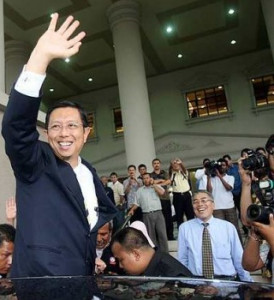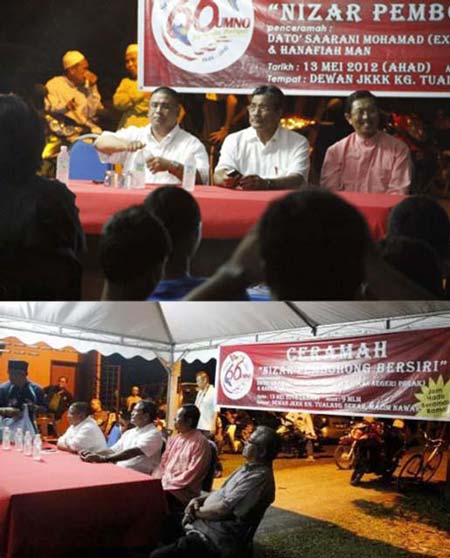 An unknown figure in 2008, Datuk Seri Mohd Nizar Jamaluddin took the Perak Menteri Besar (MB) post under a cloud of suspicion. PR’s sterling performance and the 2009 illegal power-grab in Perak has changed that forever. Thrust into the national limelight, he became the rallying figure for the return of justice to Perak and Malaysia.
An unknown figure in 2008, Datuk Seri Mohd Nizar Jamaluddin took the Perak Menteri Besar (MB) post under a cloud of suspicion. PR’s sterling performance and the 2009 illegal power-grab in Perak has changed that forever. Thrust into the national limelight, he became the rallying figure for the return of justice to Perak and Malaysia.
Indeed many today are pining for his return to the MB post. The charismatic PAS leader recounts to the Rocket’s T.K Tan on some of challenges PR faced during its short period in government and talks about the challenges in winning back Perak and the Malays, the kingmakers in state.
What is the political mood and scenario in Perak now?
Many in Perak have been waiting for the dissolution of the state assembly since February 2009. The Bukit Gantang by-election which followed took place soon after the power grab, was a referendum on the power grab.
In addition to the fact that it was held in a former UMNO stronghold, it was an abnormal by-election. Never in history has a PAS candidate won more than 80 per cent of the Chinese votes. It was almost like D-day when Perak citizens exercised their rights.
PR’s support level in Perak is highly volatile. At the height of the crisis, the Malays were with us. Since then their support level, especially among the rural Malays had subsided.
Why was the Malay ground unfavourable to PR in the aftermath of the power grab?
Three reasons stood out. First, in order for UMNO to justify the grab, I was vilified as being a stooge of DAP and Chinese as PAS was the minority party in the state government. They told the Malays it was incumbent on them to reinstate a Malay government to protect their interest.
Secondly, UMNO charged me as being treasonous to the Sultan as I had refused to resign as MB. In the Malay eyes it is a cardinal sin to defy the Sultan even though the constitution does not provide for my dismissal as MB by the Sultan.
UMNO also lied about me selling much Malay land to Chinese businessmen. In addition the mainstream media spun much half-truths about PR’s policy of giving freehold land titles to the Malay resettlement and Chinese new village families.
Though the Malays were the biggest beneficiary of this policy, I was painted as only approving the titles for the Chinese new villagers.
Why are the Malays so susceptible towards these allegations?
 Under decades of UMNO’s brainwashing of the Malay community’s mindset, being seen as cosy to the ‘Chinese chauvinist’ DAP and espousing policies that seemingly favoured Chinese is tantamount to selling out the Malays. Hence, the easy acceptance on their part of UMNO’s lies.
Under decades of UMNO’s brainwashing of the Malay community’s mindset, being seen as cosy to the ‘Chinese chauvinist’ DAP and espousing policies that seemingly favoured Chinese is tantamount to selling out the Malays. Hence, the easy acceptance on their part of UMNO’s lies.
Many Malays were sceptical of our egalitarian policies as they, particularly the UMNO and rural ones, still had racialist mindsets. PR’s policies were interpreted as favouring the non-Malays. Which is not true, we are fair to all.
If the similar situation in 2008 reoccurs where DAP wins the most seats while PAS and PKR gets less seats overall, we will need to do some adjustments to resolve the allocation of the excos and authority positions. This is to counter UMNO’s accusations that Malays would lose power under us.
In your recent interviews with other media, you said the Malays’ support is flowing back. How true is this?
When the FELDA listing issue cropped up, some rural Malays began to show receptiveness towards our message. The NFC cows and condos scandal have jacked that up a little higher for us.
However, the federal government’s populist measures such as BR1M have dented our support level a tad. Overall, one can see that it is a fluctuating situation.
What about the civil servants? Are they an obstacle for PR?
There are around 7,900 civil servants in the state, the majority being Malays. Initially many of them were uncooperative and sceptical of us.
But we ploughed on with our work, emphasising on the five principles of justice, equality, integrity, openness and welfare. After five months, the lower level civil servants began to appreciate our efforts and determination.
Under 50 years of BN and PR’s 11 months, they have seen the difference. They had no pressure from the PR politicians to ‘look’ into their business. There was autonomy to do their work without interference. That is why almost 80 percent of the civil servants are supportive of us, till this day.
However, many top-ranking officials were not playing ball with us. Some of these heads of department already had their private agendas early on. They were fighting us through insubordination or sabotaging us. The state secretary in particular, was leaking EXCO meeting minutes and subverting our directives.
I had appealed to the chief secretary of the civil service to replace the state secretary, but to no avail. Their (the civil servants and BN plot masters) sabotage in the state government were deep reaching and pervasive; it took place from day one.
Were the allegations that DAP were controlling you and the state government true?
To say that DAP, in particular Perak DAP state chairman Ngeh Koo Ham and state secretary Nga Kor Ming were controlling the state government during PR’s tenure in 2008 is categorically untrue.
Many of the PR policies carried out during our tenure were based on the manifesto of Barisan Alternatif (BA), in which PAS and PKR were a part of then.
In fact DAP didn’t have a manifesto as specific as the BA’s edition before 2008. As I was responsible for drafting the BA manifesto, many of the policies were from my input.
Some of the tangible welfare policies that benefitted the Malays were suggested by Ngeh. As he had been an ADUN and opposition leader in the DUN before, he was well informed of the level of poverty in the state.
Through his input the state government provided rice and sugar for the hard core poor, who were mostly Malays. Even the idea to support the Islamic religious schools (SAR) came from him too.
Choosing the MB
 On 9 March 2008, PAS was given the mandate by PR to submit a candidate for the MB’s post. There were six of us (PAS had won six state seats then). The Perak PAS state leadership deliberated for more than three and a half hours to choose the candidate.
On 9 March 2008, PAS was given the mandate by PR to submit a candidate for the MB’s post. There were six of us (PAS had won six state seats then). The Perak PAS state leadership deliberated for more than three and a half hours to choose the candidate.
It was a tense atmosphere. They pointed to me first. I turned it down. Then it went round the table. All of us rejected and deferred it to the other.
The state commissioner (Datuk Ahmad Awang) asked me a second time, ‘You have to take it, the people are waiting for us to make a decision.’ I refused again and so did the other five.
Finally the leaders decided for us. For 40 minutes the six of us waited anxiously outside the room. And then I was ordered to take up the post.
Though it was a challenging 11 months, it was reassuring that many came to my help. I was guided and ably supported by the PR team and federal PAS leaders.
Unbeknownst to many, Kelantan MB Datuk Nik Aziz would personally call and advise me regularly on how to run the government and handle the opposition from UMNO. -The Rocket



